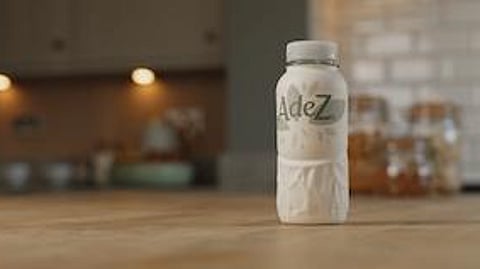
- Home
- EventsEvents
- Product Launches
- CategoriesCategories
- Advertise
- Opinion

The Coca-Cola Company’s first-ever paper bottle prototype is transitioning from the lab to the marketplace this summer through a limited online trial in Hungary. A run of 2,000 bottles of the plant-based beverage AdeZ will be offered in the pioneering package via eGrocery retailer Kifli.hu.
The paper bottle project – which is being co-developed by Coca‑Cola’s R&D team in Brussels and The Paper Bottle Company (Paboco), a Danish startup supported by ALPLA and BillerudKorsnäs, in cooperation with Carlsberg, L’Oréal, and The Absolut Company – is moving into the consumer testing phase to measure the package’s performance and shopper response to the format. Coca-Cola and Paboco unveiled the first-generation prototype, which consists of a paper shell with a recyclable plastic lining and cap, last fall.
“The trial we are announcing today is a milestone for us in our quest to develop a paper bottle,” said Daniela Zahariea, director of technical supply chain and innovation, Coca‑Cola Europe. “People expect Coca‑Cola to develop and bring to market new, innovative and sustainable types of packaging. That’s why we are partnering with experts like Paboco, experimenting openly and conducting this first-in-market trial.”
The technology developed by Paboco is designed to create 100% recyclable bottles made of sustainably sourced wood with a bio-based material barrier capable of resisting liquids, CO2 and oxygen, and suitable for beverages, beauty products, and other liquid goods. The ultimate goal is a bottle that can be recycled as paper.
The innovation supports The Coca-Cola Company’s World Without Waste sustainable packaging goal to collect and recycle a bottle or can for everyone it sells by 2030 while substantially reducing the use of virgin packaging materials and using only 100% recyclable packaging materials. Achieving this vision requires investment in innovation and collaboration with partners to drive collection, recycling, and sustainable design.
Stijn Franssen, R&D packaging innovation manager for Coca‑Cola Europe, stresses that the breakthrough technology is still developing. Franssen’s team has been conducting extensive lab testing to assess how the paper bottle performs, holds up, and protects its contents.
“This is a new technology, and we are moving in uncharted territory,” he explained. “We have to invent the technical solutions as we go along.”
